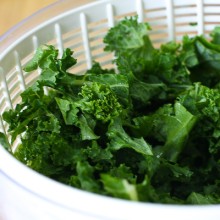Health Tips
Eat More Vegetables? Yes, You Can!

We all know that vegetables are good for us and most of us would admit that we should be eating more of them. Vegetables are packed with vitamins, minerals and fiber, and are low in sugar, sodium and saturated fat. The Centers for Disease Control and Prevention (CDC) recommends 2.5-4 cups of vegetables a day for adults, depending on your age and activity level.1
Kale to Care for Your Heart

It’s no secret that leafy green vegetables are at the head of the class when it comes to nutrition. No matter what your health goals, you will benefit by including more of them in your diet. The more common varieties, such as spinach, broccoli and bok choy, although highly nutritious, take a back seat when compared to what some refer to as “The King of Greens”: Kale.
Simple Steps to a Healthy New Year

As the New Year inspires many of us to move toward a healthier lifestyle, small but powerful changes are key to creating consistency and achieving success in our goals. Below are a few simple suggestions, any or all of which can be included in your plan for a healthier life in 2012. -Add more fresh fruits and vegetables, including raw varieties, to your meals. Try adding green beans or broccoli the next time you make pasta. Add apple and banana slices to your morning oatmeal, or include a few leafy greens in a morning smoothie.
The Okinawan Sweet Potato: A Purple Powerhouse of Nutrition

Did you know that Okinawan sweet potatoes were recently highlighted by Dr. Oz as being one of the top Superfoods of 2010?1 This vibrantly purple sweet potato, a locally grown staple of Hawaiian cuisine, is rich in flavor and packed with nutritional benefits. With Okinawan sweet potatoes in abundance this time of year, they make the perfect addition to your Thanksgiving meal.
Foods to Help Balance Blood Sugar

A plant-based diet rich in whole grains, healthy fats, vegetables, legumes, nuts, and seeds is the ideal way to help balance blood sugar levels and may help reduce your risk of diabetes. Specific foods within these categories are especially beneficial in keeping your blood sugar in check. Read on for some ideas about how to incorporate these healthful foods into your diet.
For the First Time, USDA Report Acknowledges the Benefits of Vegetarianism

In the latest report of the Dietary Guidelines Advisory Committee, a division of the USDA, a vegetarian diet is clearly established as an effective means to help prevent obesity, diabetes, and heart disease. The report also concludes, “Vegetarian diets that include complementary mixtures of plant proteins can provide the same quality of protein as that from animal protein”.1 This is the first time in history that the federal government has officially acknowledged that a vegetarian diet can improve health.
Cancer-Fighting Foods Helps Put Prevention In Your Own Hands!

According to the American Cancer Society’s “Cancer Facts and Figures, 2011”, scientific evidence suggests that about one-third of the 571,950 cancer deaths expected to occur in 2011 will be related to overweight or obesity, physical inactivity, or poor nutrition and thus could be prevented. This highlights three recommendations in regard to nutrition, physical activity, and cancer prevention:
- Maintain a healthy weight throughout life
- Adopt a physically active lifestyle
- Consume a healthy diet with an emphasis on plant sources
Eating Local from Your Own Backyard

If you are among the many people who recognize the importance of buying local produce, consider the possibility of growing your own. After all, it doesn’t get much more “local” than your own backyard!
Ways to Avoid Genetically Modified Food

Much of the food in the supermarket today is made with genetically modified ingredients or GMOs. As a consumer you can avoid GM food in several ways:
Studies Show the Effect of Pesticides on Children

Some of us may not be very concerned about eating organic. Heck, with today’s busy lifestyle, it’s a challenge just to get enough fruits and vegetables in our diet. However, there is a special group of people who may need to eat organic as much as possible.